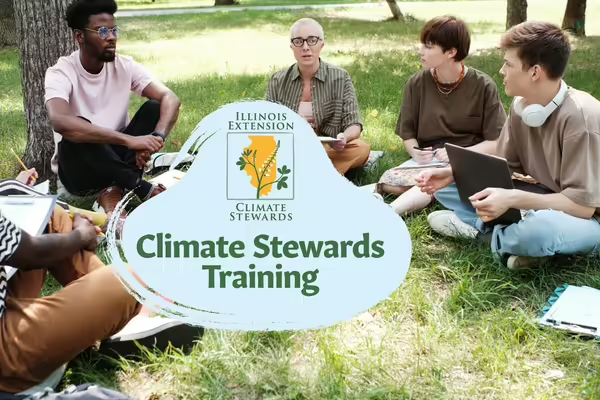
URBANA, Ill. — Climate change is a complex global challenge, but local action has an important role in empowering communities and building resiliency. The new University of Illinois Extension Climate Steward course trains environmental stewards to communicate about climate change and engage in local solutions.
Weather patterns have shifted significantly in the past century, and Illinois has dealt with both warmer temperatures and more precipitation, according to research from the Prairie Research Institute’s Illinois State Climatologist office. These changes impact everything from agriculture productivity and food access to public health and natural areas. To help communities across the state meet these challenges, Extension has prioritized the creation of several climate-smart programs, including the Climate Steward course in 2024.
“While many may feel a sense of hopelessness with this global environmental issue, we only need to look back 50 to 60 years and realize how much we’ve improved air and water quality in many areas,” said Duane Friend, Extension state climate change specialist, and state Master Naturalist coordinator. “It may seem daunting, but we have the opportunity to work with groups and communities to move this forward as well.”
The program started with a 30-person pilot last spring and officially began in the fall with 14 participants from central Illinois, and it will return again this spring. The research-based program is led by Extension educators and, over 11 weeks, explores earth systems, water, energy, and agriculture and an overview of state and local climate policies. It also includes communication training, participatory science, and community service opportunities.
After the course, Climate Stewards are encouraged to volunteer in activities ranging from community and participatory science, land and water stewardship, environmental justice and civic engagement, and education and interpretation activities. The 2024 participants planned to incorporate climate change-related health risks into their medical school curriculum, develop a climate course for adult learners, and discuss sustainable fuel sources with a local business.
“When I signed up for the program, I had many preconceived ideas about our climate,” said one participant. “This experience enlightened me and taught me that it doesn’t matter how much we know about this subject, our success will be measured by how we communicate that knowledge in a way that connects, not by the debates that are ‘won.’ ”
The next Climate Stewards course will be available online from Feb. 17 to May 5. The program is led by State Master Naturalist Coordinator and Climate Change Specialist Duane Friend. Sign up by Feb. 15 at go.illinois.edu/stewards.
Course learning modules, materials, and discussion forums are available from Feb. 12 through the end of the year on Learn @ Illinois Extension, an online learning platform. Live remote sessions will be at 5:30 p.m. on Feb. 17, March 3 and 24, April 14 and May 5. The program is limited to 25 participants and costs $200.
More information about the program is available at go.illinois.edu/ClimateStewards. For more information about Illinois Extension climate programs, contact Duane Friend at friend@illinois.edu.
Extension’s natural resources, environment, and energy program provides research-based education for awareness and action to sustain healthy environments and ecosystems that support quality living and resilient communities. Extension staff empower people across Illinois to make a difference through the volunteer programs Master Naturalists, Climate Stewards, and Master Watershed Stewards.
University of Illinois Extension develops educational programs, extends knowledge, and builds partnerships to support people, communities, and their environments as part of the state's land-grant institution. Extension serves as the leading public outreach effort for University of Illinois Urbana-Champaign and the College of Agricultural, Consumer and Environmental Sciences in all 102 Illinois counties through a network of 27 multi-county units and over 700 staff statewide. Extension’s mission is responsive to eight strategic priorities — community, economy, environment, food and agriculture, health, partnerships, technology and discovery, and workforce excellence — that are served through six program areas — 4-H youth development, agriculture and agribusiness, community and economic development, family and consumer science, integrated health disparities, and natural resources, environment, and energy.